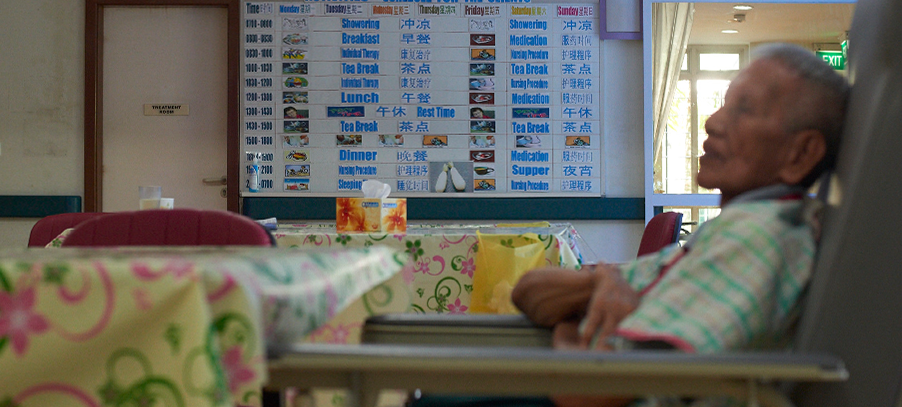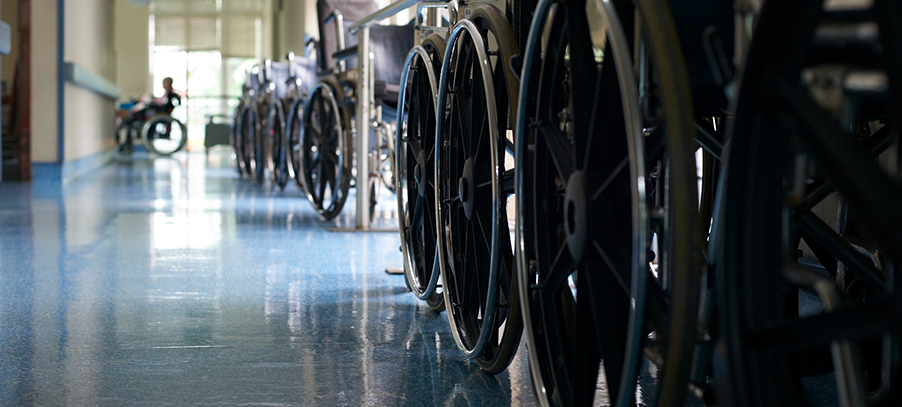Breaking the Elderly
Well meaning methods though seemingly harmless, can be detrimental to one’s well being.
If a tree falls in a forest and no one is around to hear it, does it make a sound?
If an elderly in a nursing home cries in despair and no one is around to hear her, does she experience pain?
Can we assume that the fate of the elderly is in their own hands and not in those of the caregivers in the nursing homes?
Can we assume that the well-meaning practices used for elderly care are indeed the best practices for the elderly?
Is it possible for a nursing home that’s build to shelter and protect also robs its occupants of their dignity and independence?
Is it possible that a home, which is akin to care, warmth and comfort, also reeks of unintentional neglect, hopelessness and misery?
Can we take for granted that the cries of the elderly in the nursing homes will eventually stop on their own?
Can we take for granted that the despair suffered by the elderly will cease without intervention?
Well meaning methods though seemingly harmless, can be detrimental to one’s well being.

Physically Restrained
Many residents are still being tied down despite it being a “last resort”. Physical restraints are used to prevent falls, but observations have found that even without the use of restraints, fall rates do not increase.
Well meaning methods though seemingly harmless, can be detrimental to one’s well being.

No Autonomy
Waking, sleeping, eating and even bathing is scheduled. Nothing deviates from the schedule. Space for personal items are limited. Many only have a bed, cabinet and toothbrush to call their own in the last years of their life.
Well meaning methods though seemingly harmless, can be detrimental to one’s well being.

No Dignity
Afraid of soiling themselves at night and not being able to get help in time when they call, many end up relying on adult diapers. Long term use of diapers increases their dependence on it and does nothing to reduce their incontinence.
Well meaning methods though seemingly harmless, can be detrimental to one’s well being.

Disabling
Most of their time is spent confined to beds or chairs, which causes the elderly to decondition more easily. As they walk less, it further weakens their ability to walk in the future.
Well meaning methods though seemingly harmless, can be detrimental to one’s well being.

Prison-Like
Surrounded by uniform-clad residents and staff, dormitory styled rooms, metal grills and locked doors, a nursing home is the furthest description from home. It is not uncommon for many to stay for years without receiving visitors at all.





Follow Anita on her journey as she documents her experience of staying in a nursing home. Join her as she updates us live via v-logs and tweets.
Anita Kapoor subjects herself to life in a Nursing Home
Anita attempts a 2-week long stay in a local nursing home to experience first-hand what the elderly go through daily. Immersed in a place most would hardly call home, would this experience change Anita forever?
About Anita Kapoor
Anita Kapoor is a talented host, television presenter, writer, as well as a strong advocate for the elderly. She believes in making a difference and being a voice for the disadvantaged in society.
Can You Speak in Dialect?
Conversations in dialect often elude us because we do not use dialects often. Unlike our parents or grandparents, many of us are unable to speak it as fluently anymore.
However, it is through dialects that we discover a side of Singapore we would never really have known of otherwise.

In Singapore, where family has long been seen as the first line of support in caring for the elderly, sending a loved one to a nursing home is still shrouded in stigma. Residents are largely clean, fed and physically safe. But in keeping with the philosophy that these homes should be places of dire need, rather than choice, residents’ wishes and preferences have seldom been spoken about.
Once he or she moves in, a resident’s individuality is often eroded by conformity and the dreary rigour of routine. This must change.
Here is a charter advocating a more evolved philosophy of care that Singaporeans can hope to attain – where debilitation and dependence need not rob a person of dignity and purpose, of the passions, privileges and autonomy that make him or her human.
1. Nursing home residents should live in a home-like environment where they can personalise their living areas and have privacy when they need it.
2. Married residents should be given the choice to have their own room with adjacent beds, should both spouses live in the same facility.
3. As far as their cognitive and physical abilities allow, residents – rather than those who pay for their care – should make decisions on their care and living preferences. With the help of regular therapy, residents should be enabled to regain the ability for self-care, where possible, instead of expecting to be attended to night and day.
4. Restraints, physical or otherwise, should be an absolute last resort. Residents should not be made to use wheelchairs and diapers or be tube fed for the convenience of care staff or to increase work efficiency. Should any of these be required for clinical reasons, every effort must be made to wean residents off wherever and whenever possible.
5. Residents must be respected as people rather than merely patients and have their individual needs and preferences taken into account. This should extend to their cultural and religious practices, languages they speak and preferred daily schedule, including their meals, care plans and activities.
6. Instead of being clustered in large groups for generic activities, residents should be empowered to form interest groups with other residents and take part in activities that interest them personally, following the example of co-curricular activities in school.
7. Residents or their families should be given a choice to be involved in the day-to-day running of the homes, including planning meals and activities.
8. Residents or their families should be able to raise issues that bother them and have access to a clear dispute-resolution process. Whistle-blowers should be protected. There should also be legal safeguards to prevent residents from being involuntarily discharged during the investigation process.
9. All nursing home fees, including those of consumables, should be published online. Any hikes should be communicated clearly to residents in advance and updated on the website promptly.
10. Residents or their families must accept personal responsibility for their own actions and choices, especially if they value personal autonomy over safety and face an increased risk of mishaps and accidents. They should also be considerate of the needs of fellow residents and staff and should not harass or abuse them.
To date, We have
80,350
supporters and counting.
A series of papers commissioned by the Lien Foundation and the Khoo Chwee Neo Foundation.
Radha Basu, Published October, 2016
By 2030, Singapore would have become a “super-aged society” like Japan, with one in four considered a senior citizen.
Singaporeans are living longer, but they are not necessarily living well.
As birth rates plummet and the number of family caregivers shrink, more are turning to nursing homes for long-term professional care.
However, nursing homes struggle with clinical, regimented routines due to staff shortage.
Some nursing homes are also stuck in a physical time warp.
With 20 or more people sharing a room, many stay on for years with little more than a bed, cabinet and toothbrush to call their own.
Among those surveyed, the longest a single resident has stayed in a nursing home is 27 years.
Despite earning less than many domestic workers, a single staff member might need to look after 20-30 residents at night.
It is little wonder then that homes prioritise health and safety over dignity, autonomy and social support.
Can we strike a better balance between medicine and meaning?
This report offers an overview of nursing homes today, suggests possible ways to overcome challenges and hopes to generate fresh debate on the need for a new narrative for nursing homes.
For more details, download the full report here.
A series of papers commissioned by the Lien Foundation and the Khoo Chwee Neo Foundation.
Oliver Wyman, Published July, 2016
Currently, some 12,000 nursing home residents live under institutionalised care.
If we choose to do nothing, by 2020, an estimated 5000 more residents will live under the same conditions.
In developed countries, models of care have greatly shifted towards a habilitative one, but Singapore seems to be stuck in the past– maintaining rooms eerily similar to the likes of army barracks.
Is the possibility of a home-like environment, privacy and person centred care, out of reach for Singapore?
Experts have come together to develop a new nursing home model – one that is workable and yet significantly raises the quality of life for residents. All we have to do is to make this possibility, a reality.
This report, explores a habilitative model for nursing homes in Singapore: how it works, its feasibility, benefits and projected costs.
For more details, download the full report here.
A public survey commissioned by the Lien Foundation and NTUC Income.
The Nielsen Company, Published October, 2016
In the latest figures released by the Department of Statistics Singapore, the city state has passed the half-way mark to hit 900,000 seniors (those above 65 years old) by 2030.
To understand better the needs of Singapore’s rapidly aging population, the Lien Foundation and NTUC Income collaborated on this survey to gain insights to Singaporeans’ aspirations and concerns about growing old in Singapore.
998 respondents between 30 and 75 years old in Singapore were surveyed. Running in tandem with the respondents’ concern about ‘ageing in place’, 78% of them preferred to stay in their own home, independently or with their spouses during their silver years.
When it comes to alternative living arrangements and preferences, nearly half of the respondents (47%) are willing to stay in assisted-living facilities; three in five (60%) think that residents in nursing homes should stay in single or twin-bedded rooms. Close to half indicated that it is unacceptable to stay in 6-8 bedded rooms for the rest of their lives.
The Lien Foundation would like to invite the public to give their feedback on their experiences with nursing homes and/or the improvements they wish to see there, as well as their aspirations for residential aged care by emailing feedback@nursinghomes.sg
For more details, download the findings here.